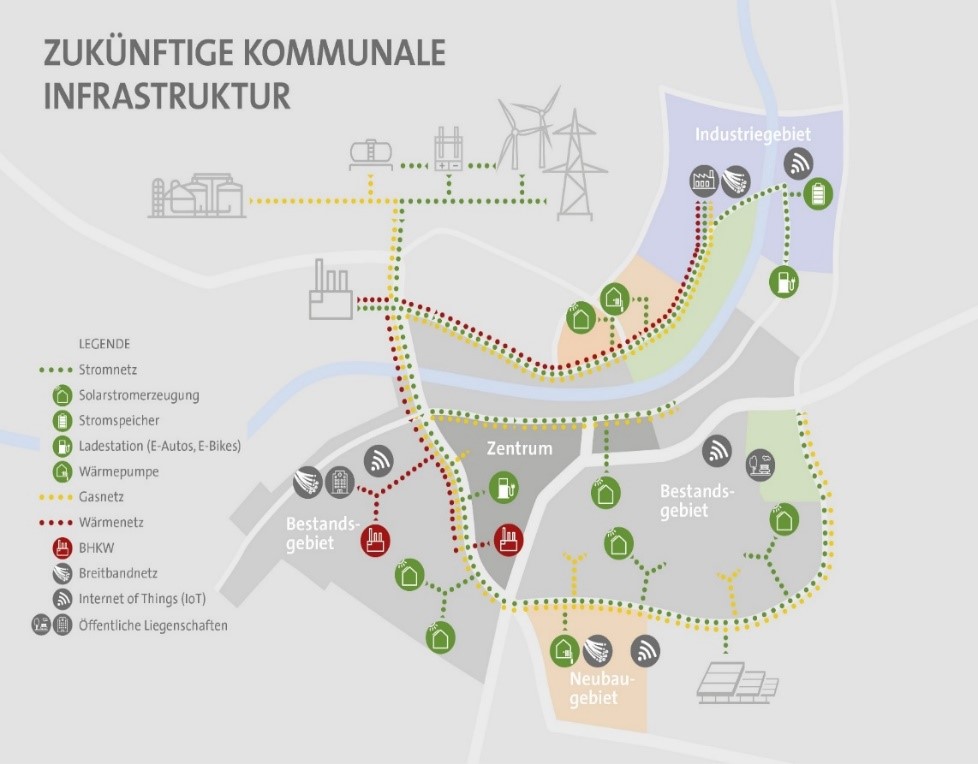| Duration: | 11/2021 - 04/2025 |
| Contracting Authority / Sponsors: |
Bundesministerium für Wirtschaft und Klimaschutz (BMWK) |
| Project Partners: | bnNETZE GmbH Freiburg (Verbundpartner), Umweltamt Stadt Freiburg, Siemens AG München/Berlin, Senatsverwaltung für Wirtschaft, Energie und Betriebe Berlin (alle assoziierte Partner) |
| Project Focus: |
EnEff:Stadt: PED-urban
Development of methods and tools for balancing, planning and operation of climate-neutral urban districts as "Positive Energy Districts – PEDs" as well as cooperation in the IEA-EBC Annex 83
In order to achieve climate neutrality in Germany by 2045, one of the decisive factors is the extent to which energy consumption for living, working, leisure, consumption and mobility in cities can be reduced and replaced by climate-neutral energy sources. In the European Union, the concept of so-called "Positive Energy Districts" (PEDs) is being pursued for this purpose: PEDs are climate-neutral neighborhoods that have a positive effect on the upstream energy system. The buildings in PEDs are energy efficient and their heat supply is climate neutral. PEDs consistently exploit the potential for renewable energy generation in the neighborhood to maximize energy demand for electricity and heat. Mobility in PEDs is electrically driven and multimodal.
The goal of a high self-sufficiency share in the neighborhood with a positive effect on the upstream energy system requires an integrated energy system with the coupling of all energy sectors (electricity, heating, cooling, mobility), the use of storage and the application of intelligent control. So far, however, there is still a lack of essential basics for the planning and implementation of such climate-neutral Positive Energy Districts. PED-urban investigates and develops solutions for the realization of PEDs that can be deployed in urban neighborhoods in the future. To effectively support municipalities in planning and implementing climate-neutral neighborhoods, PED-urban pursues the following goals:
- Demonstrate a methodology for holistic planning of PEDs on two neighborhoods in Freiburg and Berlin and make it available to other stakeholders,
- Develop approaches for planning and developing PEDs for residential and commercial quarters of all types (especially urban quarters, which are more challenging),
- Developing approaches for the climate-neutral redevelopment of existing neighborhoods such as Freiburg-Waldsee, taking into account the challenge of transforming the energy infrastructure and activating a large number of local stakeholders to implement the measures, and
- Provision of methods and tools demonstrated on practical examples to ensure high practicality of the solutions and preparation of the results for rapid multiplication.
Within the framework of the project, two urban neighborhoods (Freiburg's Waldsee neighborhood and the Siemensstadt 2.0 neighborhood in Berlin) are being scientifically supported and accompanied in their energy development into climate-neutral neighborhoods in the sense of a PED. Advanced planning methods are used to improve neighborhood planning. In the sense of a real laboratory, feedback from project developers (municipal and private), energy supply companies, property owners, users and residents will be used to optimize the definitions, methods and tools and to make them suitable for practical use. In doing so, the project will demonstrate the extent to which the PED concept is a practical and helpful objective for urban neighborhoods. On this basis, general recommendations for the implementation and optimized operation of PEDs in urban neighborhoods will be developed.
